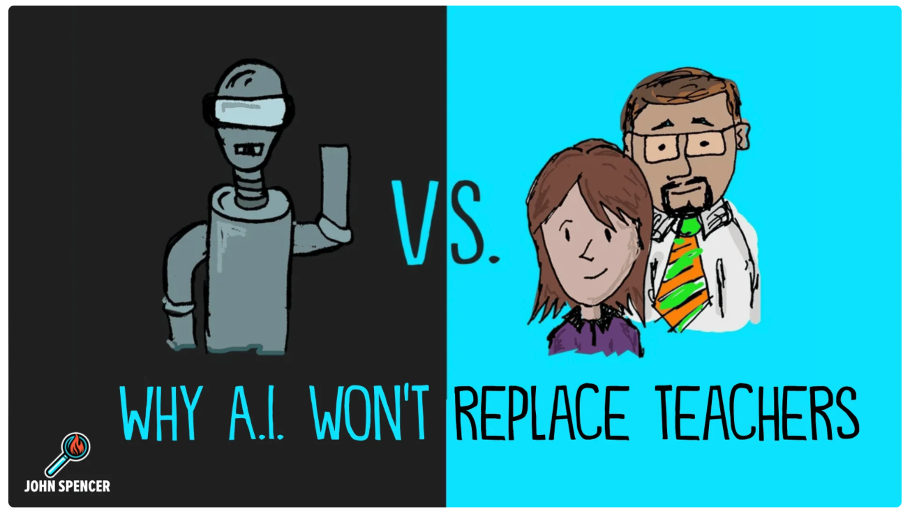AI cannot replace teachers
This is a condensed version of John Spencer’s blog, Why A.I. won’t replace teachers.
John Spencer emphasizes that teachers are irreplaceable despite the hype about AI potentially replacing them. He asserts, “The teachers who can leverage the human element through authentic learning will ultimately prepare students for an unpredictable world shaped by AI.”
Watch John Spencer’s 3:30-minute video where he promotes celebrating the lo-fi in a world that often presents, according to John Spencer, a false dichotomy between digital and physical, technological and human elements.
Link to the 3:30 min video:
John Spencer acknowledges his love for technology and the Apple ecosystem yet he also cherishes the physical, tangible experiences. For instance, there is joy in playing a song on an acoustic guitar or crocheting a blanket that results in a creation that reflects the knitter’s creative approach. There is a pleasure in creating art using various supplies like duct tape, cardboard and random objects, producing creations that can be both spontaneous and polished. Similarly, a hand drawing of a sketch of a plant or of a diagram helps create in the person doing the hand drawing the synaptic connections needed to move the information from the short term memory to long term memory in that person.
“Life is short; we do not need to compress it any futher,” and “in a world of automation, I don’t want to crush creativity.”
AI can write an beautiful essay for the student, yet, what is the goal of writing a great essay? The art of writing is critical to making mea ning; we learn through writing. So, yes, while AI may help generate ideas, it is the writer, the human, who must add his voice and make the essay unique.
Some may envision a future where AI delivers highly personalized educational experiences, potentially rendering teachers obsolete. AI can indeed save time for teachers, creating for them the support and the possible scaffolding needed to meet individual needs; it can be a starting place for teachers, but it is the teacher that modifies, customizes these supports for learners. Teachers understand their students in ways that algorithms do not.
Adaptive learning is efficient, streamlined, fast, content driven and often machine-driven. In contrast, personalized learning is messy and deeply human, characterized by its inefficiencies and a foundation on student empowerment and human interaction.
What is it that we, as humans, can do that machines cannot? It might involve developing empathy, compassion, thinking divergently, wisdom, curators of information, fostering curiosity, or coming up with innovative solutions. Should we accept that AI cannot adequately fulfill the role of teaching for those skills?
<strong>Dr. John Spencer</strong> a former middle school teacher and current college professor on a quest to transform schools into bastions of creativity and wonder. He explores research, interviews educators, deconstructs systems, and studies real-world examples of design thinking in action. He shares what he is learning in books, blog posts, journal articles, free resources, animated videos, and podcasts.
Condensed version of the article written by Marcia Banks for LePôle.education.
